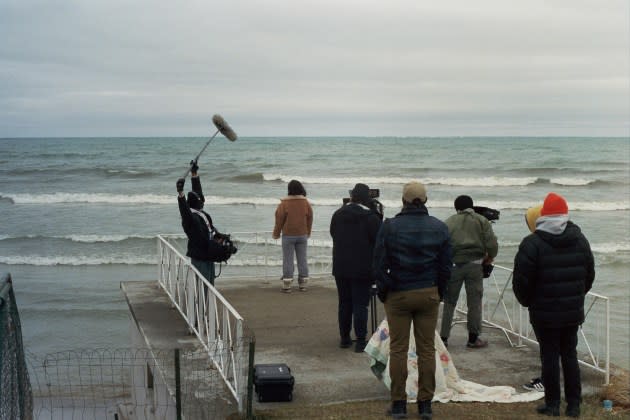The Future of Filmmaking Is Independent — and DePaul’s Indie Studio Leads the Way

This story was created in paid partnership with DePaul University.
The trailer for Waiting for the Light to Change, an independent feature film produced entirely through DePaul University’s Indie Studio, opens on a wistful scene: five friends run excitedly out of a worn down prius in an open field at dusk while on their way to a weeklong winter getaway at a secluded lake house, where the group negotiates the existential tumult of their early twenties.
More from The Hollywood Reporter
Final 'The Marvels' Trailer Sees a Band of Heroes Unite for "One Last Fight"
Inside The Hollywood Reporter Japan's Glitzy Tokyo Film Festival Party
Created as the latest release from DePaul’s Indie Studio—an in-house program dedicated to helping students navigate the film industry’s dynamic digital landscape—the film serves as MFA Directing Graduate Linh Tran’s directorial debut and impressively features an all-student cast and crew. Since its premiere at the 2023 Slamdance Film Festival, Waiting for the Light to Change has made tremendous waves, including winning the festival’s Grand Jury Prize—a distinction that no film written, directed, acted in, and fully produced by students has won at a major festival. On the heels of the film’s festival success, Waiting for the Light to Change was then acquired by Bill Vergos, the head of Digital Distribution at Byron Allen’s Freestyle Media—which just released the film on all major platforms following a two week theatrical run to qualify for the Spirit Awards.
“I honestly never intended for the film to be anything—I just thought of it as a great exercise, and it turned out to be way more successful than any of us anticipated. We went through a whole year of rejections before we got anywhere, so I’m happy to see people opening up to it and giving everybody on the crew new opportunities to make other stuff,” Tran shares. “I’m really grateful—I wouldn’t do anything differently, I would say, because everything led us here.”
Founded in 2017, each year, DePaul’s Indie Studio finances a micro-budget project—giving students hands-on experience with every phase of the film creation process, from development and production to post-production and distribution. The application-only course is offered through DePaul’s School of Cinematic Arts, where eight to ten students are annually selected to produce an indie film with budgets of $15,000-$20,000.
“More than anything, Indie Studio is really just about creating a new frame of mind in the way that we think about film: it’s about getting people to understand that, as long as you can tell a good story, it’s going to be embraced by the public,” explains James Choi, an assistant professor at DePaul’s School of Cinematic Arts and founder of Indie Studio. “I just think that students in the program walk away with this mindset of ‘I can do this. I can create and tell stories, without the biggest obstacles that stand in the way of filmmaking—which is money.’”

DePaul is certainly no stranger to helping students gain hands-on experience—take, for instance, their Project Bluelight program founded in 2004—and the university’s diverse departments and student interests make them perfectly positioned to support students through the end-to-end film creation process. “DePaul has an excellent theater school, and so many of those actors are craving an off stage experience and an onscreen experience,” shares Daniel Klein, DePaul’s Co-Chair of the Master of Fine Arts in Film and Television Directing.
“It’s nice at DePaul that, despite the size of the program, the students are encouraged to collaborate with one another and spend time learning. There is no barrier when it comes to production: you’re either invested and you want to work on stuff, or you’re not—in which case, you’re not there,” Klein elaborates.
Today, student collaboration remains one of the biggest facets of the program. When considering applications, Choi looks specifically for students who have not only honed their own voice, but also managed to work with others and developed their own perspective in a sea of influences: “Everyone on the crew, including the producers, sound, post—everyone is a student. So I’m looking at what they’ve done in terms of networking, collaboration. How committed and dedicated are you to your work? And what does your body of work represent?”
In an age where the average consumer phone camera can shoot as impactful of a feature film as a pro camera and content creators are posting full-length features on YouTube and Vimeo, it can be difficult to apply a traditional filmmaking perspective to contemporary indie features. And for Choi, meaningful collaboration and powerful storytelling will become that much more important as digital technology continues to advance and reduce the traditional barriers to entry for filmmaking—skills he strives to help students build through the Indie Studio experience.
“If you look at the history of film, you’ll see that the filmmaking process created through Hollywood is only 100 years old—and we still maintain that today in 2023. We’ve lumped together the independent world of filmmaking and studio films but the process is completely different. It’s like apples and oranges,” Choi shares.

Through Indie Studio, Choi aims specifically to teach students the unique process of what it means to make a truly independent film, while simultaneously eschewing legacy beliefs that all projects need big budgets and big name talent to have their stories heard: “When the business model is based on this exclusivity around money, that completely changes how people approach equity, who can tell stories, and what can be told starts to become very narrowed.”
Ultimately, championing indie films helps make filmmaking more accessible for all communities—opening the doors for more diverse stories, especially those from historically marginalized stories, in the mainstream and beyond.
‘I think it’s so important to educate the students and get out of that realm of, ‘I’m gonna go make Fast and Furious.’ That’s fine, those aspirations are great,” Choi explains. “But there is no roadmap to learning how to do that before you do it. You just have to tell great stories and utilize what’s in front of you. And if you do that, well, you’ll get those opportunities.”
Best of The Hollywood Reporter

 Yahoo News
Yahoo News 
